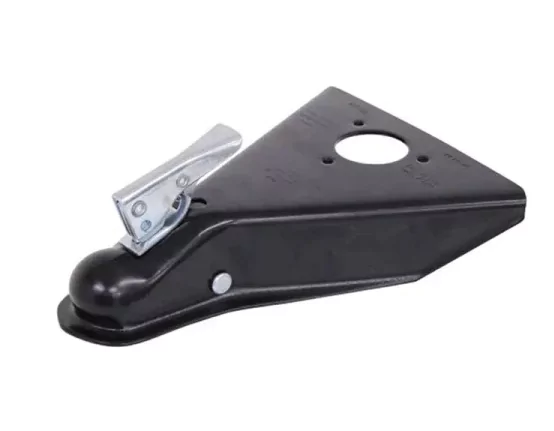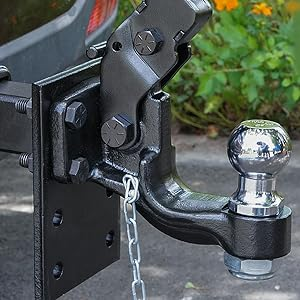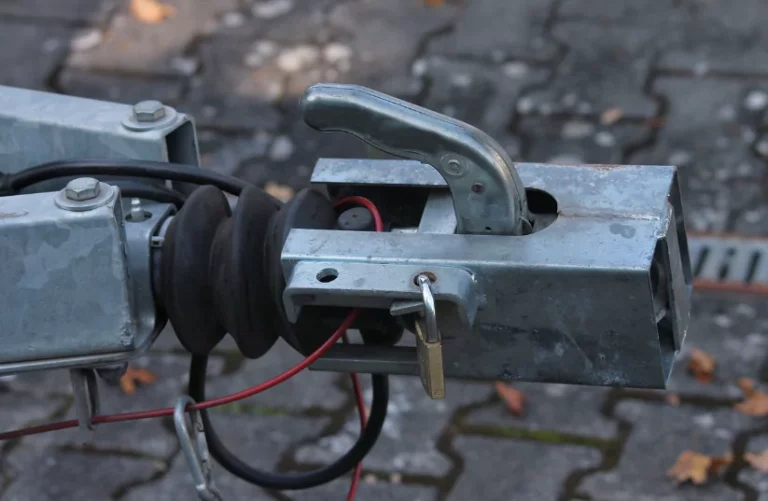Trailer Hitch Couplers
What is a Trailer Hitch Coupler?
A trailer hitch coupler is an essential part that links a trailer to the towing vehicle. It effectively functions as the connector that enables both the vehicle and the trailer to operate together, guaranteeing a smooth and stable towing experience. This mechanical device generally fits over the trailer hitch ball on the towing vehicle, securing the trailer in place when properly engaged. Knowing how a coupler operates is vital for anyone involved in towing, whether it’s for recreational or professional purposes.
Types of Trailer Hitch Couplers
Straight Couplers
Straight couplers are commonly used in various towing applications due to their simplicity and effectiveness. These couplers are designed to slide directly over the hitch ball, providing a straightforward and secure connection. They often come with a locking mechanism to ensure the coupler remains attached during transport. Straight couplers are particularly useful for smaller trailers and utility vehicles. Among them, the famous models of Go Trailer include 50mm ball, 60mm channel and 1-7/8″ball,2000lbs.
Australian Couplers
Australian couplers, also known as off-road couplers, are designed for rugged terrains and demanding conditions. These couplers feature a more robust construction, accommodating the challenges of off-road towing. They often come with additional locking features and are built to withstand higher stress levels, making them an ideal choice for heavy-duty trailers and off-road adventures. Examples include Go Trailer’s 10,000lbs Forged Tow Hook Trailer Hitch Ball Mount and 4.4T Australian Override Brake Trailer Coupler.
Adjustable Couplers
Adjustable couplers offer a high level of versatility, allowing users to easily adjust the height of the coupler to match the varying heights of different towing vehicles. This type of coupler is particularly useful when multiple vehicles are used for towing the same trailer, reducing the need for frequent adjustments. The ability to modify the coupler height also ensures a more level and stable towing experience. What’s worth knowing about this type of Coupler is the Go Trailer’s 1-7/8″ ball,4500lbs,Cast.
A-Frame Couplers
A-Frame couplers are crafted to match A-frame trailers, offering a distinctive attachment method tailored to the trailer’s specific structure. These couplers typically feature a triangular mounting plate that snugly fits over the trailer’s A-frame. They ensure a stable and secure connection, which is crucial for towing A-frame trailers safely and effectively. For example, Go Trailer’s 2-5/16″ ball,10000lbs and 2″ ball,5000lbs are typical A-Frame Couplers.
Compatibility with Different Vehicles and Trailers
Trailer hitch couplers come in various sizes and configurations to match different types of vehicles and trailers. Compatibility is a key factor when selecting a coupler, as an improperly matched coupler can lead to unsafe towing conditions. Factors to consider include the coupler size, the trailer hitch ball size, and the towing capacity of the vehicle. It’s essential to ensure that the coupler and the towing system are fully compatible with each other to guarantee a safe and reliable towing operation. Additionally, some couplers are designed to work with specific vehicle and trailer combinations, offering a more tailored towing solution.
Go Trailer
Brief Introduction
Go Trailer is a leading provider of trailer towing solutions, specializing in high-quality couplers and related accessories. Known for their innovation and reliability, Go Trailer offers a wide range of couplers designed to meet the diverse needs of both recreational and professional towing. Their products are engineered to provide optimal performance, ensuring safety and ease of use for all towing applications.
Examples of Couplers
The 50mm Ball Trailer Coupling and the 2/3/4 Hole Trailer Hitch Coupling are robust and reliable towing accessories designed to handle a maximum load capacity of 2000KG/4409lbs. The ball size of 50mm ensures a strong and secure connection between the trailer and the towing vehicle, while the multiple mounting hole options (2, 3, or 4 holes) offer versatility and added stability during towing. Crafted to the AS4177-3 standard, these couplings meet the highest industry safety requirements and are suitable for a wide range of trailers and towing applications.
Boasting a sturdy construction and made from high-quality materials, these couplings are built to withstand heavy loads and endure harsh towing conditions. Their durability and longevity are further enhanced by their resistance to corrosion and weather damage, making them suitable for both indoor and outdoor use. Easy to install with clear instructions and all necessary hardware included, these couplings save time and effort during the installation process. Overall, the 50mm Ball Trailer Coupling and 2/3/4 Hole Trailer Hitch Coupling are essential components for any towing operation, ensuring safe, efficient, and reliable connections between trailers and towing vehicles.
Customization
Go Trailer also provides various customization options for their couplers, enabling users to adapt their towing setup to meet specific needs. Whether it involves adjusting the height of an adjustable coupler or adding extra locking mechanisms for increased security, Go Trailer offers solutions that can be tailored to individual requirements. This customization is particularly advantageous for users with unique towing challenges or specific performance expectations. By offering these personalized options, Go Trailer ensures that their customers experience the best possible towing performance, regardless of the situation.
How Does a Coupler Work?
Understanding the process by which a coupler functions is essential for safe and efficient towing. At its core, the coupler acts as a secure junction between the trailer and the towing vehicle. Here, we will elaborate on the mechanics, the significance of the locking mechanism, and essential maintenance tips to ensure optimal performance.
Mechanics of a Coupler
A coupler operates by latching onto the hitch ball of the towing vehicle, creating a pivotal point that allows for smooth movement and directional control. When the coupler is placed over the hitch ball, a spring-loaded collar or a lever system clamps down, ensuring a tight and secure fit. This locking mechanism is designed to prevent the coupler from disengaging accidentally during the journey.
The connection established by the coupler is crucial for maintaining stability, as it helps distribute the weight of the trailer evenly across the towing vehicle. Various design components, such as the shape and size of the hitch ball and the internal structure of the coupler, are engineered to maximize this stability. High-quality couplers often feature additional elements like shock absorbers and load distribution features that further enhance the towing experience.
Importance of the Locking Mechanism
The locking mechanism in a coupler is crucial for maintaining the trailer’s secure attachment to the towing vehicle during transit. This mechanism generally includes a latch or clamp that secures the hitch ball. It is engineered to endure substantial forces, such as bumps, turns, and stops, which frequently occur while towing.
In addition to the primary locking system, many couplers are equipped with secondary locking devices, such as safety chains or pins, that provide an extra layer of security. These additional precautions are critical in preventing accidents that can occur if the primary locking mechanism fails. Regularly inspecting and maintaining the locking mechanism is vital to ensure that it operates correctly and safely under all conditions.
Maintenance Tips for Optimal Performance
Proper maintenance of your coupler extends its lifespan and ensures safe towing operations. First and foremost, regular inspection is essential. Check for any signs of wear, rust, or damage on the coupler and the hitch ball. It is also important to lubricate the moving parts of the coupler to prevent friction and ensure smooth operation. Using high-quality grease can reduce wear and tear on the components and keep the coupler functioning efficiently.
Additionally, tightening all connections and ensuring that the locking mechanism is functioning correctly can prevent unexpected failures. Cleaning the coupler and removing any debris or dirt that may have accumulated can also help maintain its reliability. Lastly, replacing any worn-out parts immediately will prevent minor issues from becoming significant safety hazards.
Summary
Grasping the detailed mechanics of a coupler and its vital role in towing operations is crucial for those involved in this sector. The functionality of a coupler enables it to establish a stable and secure link between the towing vehicle and the trailer, with the locking mechanism guaranteeing that this connection remains firm under diverse conditions. Through proper maintenance and regular checks, a coupler can deliver dependable performance and improve the safety of your towing activities. By focusing on these important factors, you can ensure that your towing arrangement functions efficiently and securely, whether for recreational or professional purposes.







